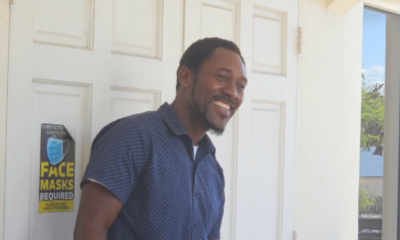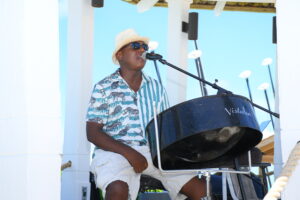News
Man Spared a Life Sentence in Serious Wounding Case
Published
2 years agoon

Wilkie Arthur
Freelance Court Reporter
#TurksandCaicos, December 15, 2023 – He was busted in the head and sliced from back to front of his neck; the images of the injuries are blood curdling.
It was supposed to be a short and straightforward wounding with intent trial, instead it ended up running a near three weeks due to complications and objections in the matter.
The accused is Mr. TERINE HARVEY AKA TC and the Office of the Director of Public Prosecution (DPP) brought him before the court on allegations that he on Thursday June 16th, 2022 in Pine or Sam Wilson Yard did maliciously and unlawfully wound Valman “Val” Forbes.
The trial started on Monday October 30th and ended on Friday November 17th 2023.
Representing the defendant, TC, was Senior Human Rights Defense Attorney, Sheena Mair. For the Office of the DPP was Senior Public Prosecutor, Nayasha Hatmin.
On October 30th there were issues in the jury process due to insufficient numbers to commence impaneling, and her Ladyship Ms. Tanya Lobban Jackson adjourned to the following day for more potential jurors to attend court.
The jury numbers slowly became sufficient throughout the day on October 31, but the case still could not proceed because the prosecutor with conduct of the matter Mrs. Hatmin was ill and Principal Public Prosecutor Clement Joseph was holding for her.
Mr. Joseph, Ms. Mair and Justice Lobban Jackson discussed and agreed to move forward with the jury selection and five women and two men were picked with the trial set to start the following day, November 1.
When the virtual complainant, Valman “Val” Forbes took the stand, he began his testimony by swearing on the Bible to tell the truth and nothing, but the truth.
Forbes said on the night of June 16th, 2022, TC cut him with something sharp that he didn’t see. He said he only saw TC’s hand moved swiftly when he tried to turn around and held his neck after feeling the swipe. Val told the jury he heard a bottle bust, and shortly after, he was cut by TC. He didn’t see him bust the bottle.
Val gave testimony of how he had to do two or three different statements because his first statement got lost by police officers. His supporting witness refused to cooperate with the police to give another statement, having learned that the first statement given went missing.
Val Forbes told the court that he and TC had a problem before, and the day of the incident was a continuation. He said they were in Sam’s/Pine’s Yard in Kew Town, playing Dominos, gambling and drinking. He admitted, and yes, “smoking weed too.”
He said he and TC argued on more than one occasion and what he think really got him when he told him, “Boy girls/women looking for money these days,” suggesting that TC has none.
Forbes said TC kicked him on his leg and he (Forbes) punched him; they got into a fight.
“I had to show him, he ain’t ready for me.”
Throughout Forbes’ testimony, in an upset and uncomfortable manner, he kept belittling and stating derogatory comments and statements about his alleged attacker as he sat in the defendant’s dock.
The complainant said “he thinks because I have one arm, he could have handled me, but he had to go get something and cut me.”
There were even seemingly irrelevant statements made including about a relationship, Forbes claims to have had with a police woman and how he “can’t stand her anymore.”
Val Forbes spent three days testifying in the witness stand and the cross examination could easily summed up as an unpleasant experience.
Having realized the VC, Val Forbes was not cooperating or unwilling to cooperate with her under cross-examination; Sheena Mair asked him if he smokes cocaine? He replied, “Yes, we do that sometimes.”
She asked him if he’s high on ‘coke’ now while testifying, however Forbes denied being high at the time. Still he showed signs of being agitated and irritable in the lengthy intense cross-examination by the defense.
What also appeared rather shocking and surprising was that the doctor testified and made no mention of the head injury. Dr. Gregory Lawdell only spoke of the size, the depth, the seriousness, and in his professional opinion what he believes caused such a wound to Val’s neck.
Attorney Mair asked the doctor about Val’s behavior and mannerism toward the hospital staff that night when he came in for treatment and the doctor said he was very, very upset and angry but he doesn’t think it was towards the staff but because of what happened to him.
Forbes’ sister, Hynetta Karen Forbes testified regarding photos she took of her brother’s two injuries (head and neck) that night of the incident, as the Police nor the doctor took any photos and had none to give Mrs. Hatmin the prosecutor.
that night of the incident, as the Police nor the doctor took any photos and had none to give Mrs. Hatmin the prosecutor.
After the Crown closed their case, Sheena Mair made an application of “no case” submission to the judge Tanya Lobban-Jackson, but it was rejected.
The defense then called its only witness Jason Moore who said he refused to give the police another statement because he told them he “lied.”
Moore said he needed the money, and Val Forbes had “paid” him to lie. He told the judge and jury he went back and told the authorities what he did.
Her Ladyship Ms. Tanya Lobban Jackson, at the close of the defense and prosecution speech or closing remarks, summed up the case to the jury by outlining the evidence and the law clearly to them.
They jury was then released for deliberation and came back with a verdict of not guilty against TERINE HARVEY.
Magnetic Media was present for days throughout this trial and captured the Val Forbes on video while the jury was out deliberating.
He appeared so happy and confident in hope of a guilty verdict.
We also captured the defendant outside the court while he awaited his verdict and after the verdict of “not guilty” was delivered.
Clearly pleased with the outcome, Harvey said about his attorney, “She’s the bomb, she’s the bomb.”
You may like
-


Million Dollar Royal Jewels robbery suspect on trial
-


Sufficiency Adjourned for Blind Defendant; case still stuck
-


Man Leaves Court ‘Happy’ after Family refuses to Testify in Aggravated Burglary Case
-


TCI – Legal Briefs
-


Judge stuns, sentences “irresponsible” Indiana tourist to 8 Months in Prison for Ammo Possession
-


Nearly Five Years, Jackson Jean Baptiste Firearm and Ammunition trial gets 2024 date
News
Commonsense, Not Confrontation: Why Kamla Persad-Bissessar Is Right
Published
1 month agoon
December 27, 2025
This debate did not start with Donald Trump, and it did not start this month.
For more than a decade, this reporter has had a front-row seat to repeated, urgent calls from across the Caribbean for stronger intervention by the United States in response to gun- and narcotics-fuelled violence that has hollowed out our communities. Long before today’s headlines, leaders warned that transnational gangs were outgunning police, draining public resources and stealing our youngest people.
Much of the public messaging leaned toward calls for fewer guns flowing from the United States, but the practical response from Washington evolved into something else: tactical undergirding of the Caribbean. Training, intelligence sharing, maritime surveillance and joint operations expanded under successive U.S. administrations — Republican and Democrat alike.
Then came Venezuela.
President Nicolás Maduro proved himself an unhinged and destabilising force, openly threatening Guyana’s oil-rich territory and pushing the region to the brink of a conflict no Caribbean state could afford. The United States showed up. The threat of war was blunted. That mattered.
But while geopolitical flames were contained, the narcotics trade exploded.
CARICOM convened emergency meetings on transnational gang violence. Crime became so pervasive that it was formally classified as a public health threat. Entire communities were terrorised. Courts clogged. Police forces stretched beyond capacity.
And now — quietly but noticeably — the tempo has shifted.
While no single forensic study can capture the full picture, it is easily verifiable on the ground that major narcotics busts and trafficking activity have slowed in recent months. Something has changed. Pressure works.
This is the reality Prime Minister Kamla Persad-Bissessar is responding to.
Her critics accuse her of breaking ranks. What she is actually doing is refusing to indulge in strategic hypocrisy — demanding international help to confront narco-terrorism while appearing to defend or excuse the very networks and actors we have spent years condemning.
Sovereignty is not an insult. The Caribbean invokes it constantly. To deny it to the United States — especially when the policies in question were telegraphed months in advance and remain adjustable — is not diplomacy. It is posturing.
What is most troubling is the region’s selective memory. CARICOM has directed months of rhetorical fire at Trump-era policies, yet when disaster struck — from security crises to Hurricane Melissa — the United States remained one of the region’s most reliable supporters. Outcomes matter more than allegiance theatre.
Kamla Persad-Bissessar is not suffering from Trump Derangement Syndrome. She is applying commonsense statecraft. She understands that small states do not gain leverage by moral outrage alone, and that credibility is lost when we appear aligned with individuals, regimes or activities we ourselves have deemed a threat.
Her warning to CARICOM is simple and necessary: do not undermine your own cause.
The Caribbean’s fight against narco-violence, corruption and instability has been long, costly and painful. If pressure is finally producing results, we should be wise enough to recognise it — and brave enough to say so.
Angle by Deandrea Hamilton. Built with ChatGPT (AI). Magnetic Media — CAPTURING LIFE.
News
Beaches Turks and Caicos Showcases and Supports Local Creativity
Published
5 months agoon
September 12, 2025
September 12, 2025
PROVIDENCIALES, Turks & Caicos Islands – The Turks and Caicos Islands are home to a wealth of creativity, from artisans and craft vendors to musicians and performers. Beaches Turks and Caicos, the Caribbean’s leading all-inclusive family resort, has pledged its continued support for these individuals by providing meaningful platforms for them to share their skills and stories with guests from around the world.
The resort’s commitment is most evident in its weekly Cultural Night showcase, where visitors are immersed in the vibrant traditions of the islands. Guests enjoy live performances which feature local music genres such as ripsaw, while artisans display and sell handmade creations. This event not only enriches the guest experience but also strengthens economic opportunities for local entrepreneurs.
Entertainment Division Manager Garett Bailey emphasized the significance of Cultural Night, “we want to showcase everything the Turks and Caicos Islands culture has to offer. Our goal is for guests to leave with a deeper appreciation of the island’s art, music and traditions, while giving local talent the opportunity to share their creativity with visitors from across the globe.”
Beyond Cultural Night, Beaches Turks and Caicos also welcomes local craft vendors onto the resort every Wednesday and Friday where they are offered a direct space to market their goods. Guests have easy access to the Turks and Caicos Cultural Marketplace, where they can purchase authentic local arts and crafts.
where they are offered a direct space to market their goods. Guests have easy access to the Turks and Caicos Cultural Marketplace, where they can purchase authentic local arts and crafts.
Managing Director, James McAnally, highlighted how these initiatives reflect the resort’s broader mission, “we are committed to celebrating and sharing the vibrant culture of these islands with our guests. By showcasing local artistry and music, we not only provide entertainment but also help sustain and grow the creative industries of the Turks and Caicos Islands. From our cultural showcases to nightly live music, we are proud to create authentic connections between our guests and the people of these islands.”
Local musician Keon Hall, who frequently performs at the resort, expressed gratitude for the ongoing partnership, “being able to share my music with Beaches’ guests has created lasting relationships. Some visitors return year after year and request songs from previous performances. This partnership continues to celebrate what we do and strengthens the bond between local artists and the resort.”
The resort’s support of local artisans and entertainers extends beyond business opportunity; it is about preserving heritage and sharing stories. Guests take home more than souvenirs; they leave with experiences that deepen their understanding of Turks and Caicos’ culture and history.
Public Relations Manager, Orville Morgan, noted the importance of this commitment, “for many visitors, these interactions represent their first genuine connection to the Turks and Caicos Islands. From artisans and musicians to farmers and transport operators, our local talent helps shape every guest experience. At Beaches, we are proud to give them the stage to share their stories and their heritage.”
Beaches Turks & Caicos remains dedicated to developing cultural connections and supporting the artisans, musicians and entrepreneurs whose creativity makes the Turks and Caicos Islands unique. Each guest experience is an opportunity to celebrate and sustain the spirit of the islands.
Caribbean News
“Barbecue” is Cooked! US Turns Over 11 Million Haitians into Potential Informants with $5 Million Bounty
Published
6 months agoon
August 12, 2025
August 12, 2025
The United States just set fire to the underworld in Haiti — and this time, the smoke might finally flush out the man many call the most feared in the Caribbean.
On Tuesday, the U.S. government slapped a $5 million bounty on the head of Jimmy “Barbecue” Chérizier, the ex-police officer turned gang boss accused of orchestrating massacres, torching neighborhoods, and strangling Haiti’s capital into chaos. This isn’t just a headline — it’s a full-blown game-changer.
turned gang boss accused of orchestrating massacres, torching neighborhoods, and strangling Haiti’s capital into chaos. This isn’t just a headline — it’s a full-blown game-changer.
That kind of cash — offered under the State Department’s Transnational Organized Crime Rewards Program — is enough to turn the country’s entire population, more than 11 million people, into potential informants overnight. Add the millions in the Haitian diaspora, and Chérizier isn’t just wanted. He’s surrounded.
The Number That Changes Everything
Five million U.S. dollars today equals about 655 million Haitian Gourdes. In a country where many scrape by on less than $5 a day, that’s not just life-changing — it’s life-defining. It’s enough to rebuild homes, put generations through school, or buy a one-way ticket far from the gunfire.
In a place where trust is scarce and survival is everything, that figure is more than tempting — it’s irresistible. For Chérizier, it means every friend could be a future informant, and every loyalist might be calculating the cost of staying loyal.
‘We Will Find Them’ — Jeanine Pirro, U.S. Attorney
Jeanine “Judge Jeanine” Pirro, the U.S. Attorney, set the tone with fire in her voice. “This indictment is the first of its kind,” she announced. “Jimmy Chérizier, also known as ‘Barbecue,’ is a notorious gang leader from Haiti who has orchestrated and committed various acts of violence against Haitians, including the 2018 La Saline attack in which approximately 71 people were killed. He both planned and participated in that massacre.
“Anyone who is giving money to ‘Barbecue’ cannot say, ‘I didn’t know.’ They will be prosecuted, and we will find them. They are supporting an individual who is committing human rights abuses, and we will not look the other way.”
Pirro wasn’t just going after Chérizier. She was sending a warning to the Haitian diaspora accused of feeding his war chest from abroad: the days of claiming ignorance are over.
‘No Safe Haven’ — Darren Cox, FBI
Then came Darren Cox, Deputy Assistant Director of the FBI, delivering the muscle of America’s most powerful investigative force. “There is no safe haven for Chérizier and his network,” Cox declared. “We are closing every link, every cell.” Since January, he said, the FBI has arrested three Top Ten fugitives, taken more than 19,000 criminals off the streets, and seized thousands of tons of narcotics — enough to save millions of lives across the U.S.
The FBI’s Miami and Houston offices have already bagged one of Chérizier’s Viv Ansanm associates inside the United States without firing a shot. “These efforts are a deliberate and coordinated plan,” Cox said, “to protect our communities and confront escalating threats from terrorist organizations like Viv Ansanm.”
‘Three-Year Investigation’ — Ivan Arvelo, HSI
Ivan Arvelo, Assistant Director of Homeland Security Investigations, brought the receipts. “This is the result of a three-year investigation into Chérizier’s procurement networks, cash pipelines, and operational financing that violates sanctions,” he explained. Arvelo described 400 structures destroyed, entire communities erased, and a gang exploiting U.S. dollars, technology, and immigration loopholes to keep its killing machine running. “We tracked how Americans unwittingly bankrolled brutality,” he said — proof that the net is tightening both inside Haiti and abroad.
‘The Worst of the Worst’ — Chris Lambert, State Department
Chris Lambert, representing the State Department’s International Affairs division, gave the political bottom line.
“Mass violence in Haiti must end,” Lambert said. “The instability resulting from Chérizier’s actions fuels illegal migration, regional instability, and transnational crime. We will continue to apply every tool available — including our rewards programs — to stop the spread of unchecked violence, especially to target the worst of the worst criminal leaders threatening the people of our hemisphere.”
instability, and transnational crime. We will continue to apply every tool available — including our rewards programs — to stop the spread of unchecked violence, especially to target the worst of the worst criminal leaders threatening the people of our hemisphere.”
Lambert confirmed what many have long known: Chérizier is not just a gang leader. He commands Viv Ansanm, officially designated in May as a Foreign Terrorist Organization. In the eyes of the U.S., that makes him not just Haiti’s problem — but everyone’s.
Why Haitians May Not Resist
In Haiti, money talks — loudly. And when you put 655 million Gourdes on the table, it shouts.
That’s the kind of figure that turns casual acquaintances into informants and makes even the most hardened loyalist wonder if the payout is worth more than the risk. It’s not a matter of “if” word gets out, it’s a matter of “who will be first to collect.”
For grieving families, it’s a chance at justice. For the desperate, it’s a chance at survival. For Haiti as a whole, it’s hope — wrapped in the most dangerous of temptations.
An Answer to Prayers
For years, Haiti’s headlines have been a scroll of horrors — kidnappings, executions, burned neighborhoods, bodies in the streets. Chérizier’s name has been attached to too many of them.
This move by the U.S. isn’t just strategy. It’s personal. It’s a signal to every Haitian — at home or abroad — that the days of impunity could be ending.
I’ll admit it: when I heard the news, I danced, I sang, and I nearly cried. Not because $5 million is a lot of money, but because of what it means — the possibility, at last, of stopping the man accused of helping turn Haiti into hell on earth.
Four officials, four angles, one mission: Pirro’s fire, Cox’s grit, Arvelo’s precision, Lambert’s conviction. Together, they’ve put the heat on “Barbecue” like never before.
BBQ is cooked. The only question now is: which one of over 11 million potential informants will serve him up?





